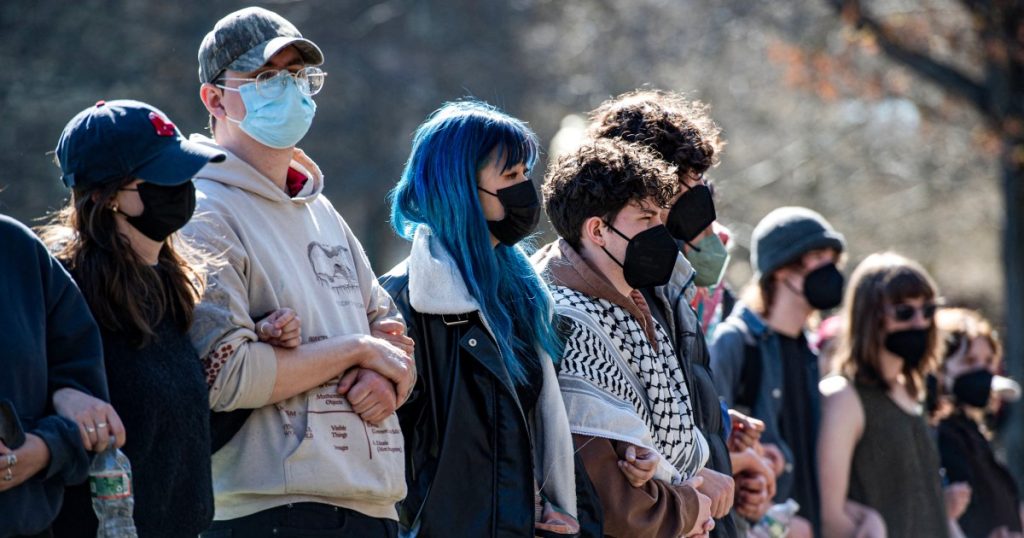About 100 people were detained from a pro-Palestinian protest at Northeastern University’s Boston campus, with the university’s police department, aided by local law enforcement, clearing an “unauthorized encampment” early in the morning. The protesters had been demonstrating for two days, but the university claimed that professional organizers not affiliated with Northeastern had infiltrated the protest and used anti-Semitic slurs, including ‘Kill the Jews,’ which crossed a line. Video footage showed a counterprotester holding an Israeli flag making the statement and being met with boos from other protesters, but it is unclear if this person was among those arrested. The leading student organization behind the protest, Huskies for a Free Palestine (HFP), criticized the administration’s response as spreading false narratives and using the antisemitic phrase as justification for the arrests. University spokesperson Renata Nyul stressed that such language had no place on any university campus.
Of the approximately 100 individuals detained, those who produced a valid Northeastern ID were released and would face disciplinary proceedings within the university, while those who refused to disclose their affiliation were arrested. Videos shared on HFP’s Instagram depicted students being arrested by police officers in riot gear. The protesters chanted slogans such as “Free, free Palestine” and questioned the need for riot gear in what they perceived as a peaceful protest. HFP accused the university administration of attempting to intimidate the protestors, affirming their commitment to advocating against the genocide in Palestine and calling for divestment from companies profiting from war in Gaza and an immediate ceasefire in the region. The protest was part of a broader movement at universities across the U.S. and Canada, with similar demands for transparency regarding financial investments and divestment from companies linked to the Israeli military.
Northeastern University’s administration was criticized by HFP for failing to address the humanitarian crisis resulting from the conflict in Gaza and maintaining ties to weapon manufacturers doing business with the Israeli military. The student group demanded disclosure of the university’s financial investments, divestment from all Israeli companies and others profiting from war in Gaza, denunciation of Israel’s actions in Palestine, and a call for an immediate ceasefire and an end to the occupation of Palestinian territories. Similar protests have taken place at universities like Columbia, the University of Southern California, Emory, and Arizona State University, where 69 people were arrested for setting up an encampment in protest. These demonstrations reflect a broader movement on campus for Palestinian human rights, with students seeking transparency from their institutions and advocating for divestment from companies involved in the conflict.
The situation at Northeastern University highlights the tensions that can arise on campuses when addressing sensitive geopolitical issues such as the Israeli-Palestinian conflict. The involvement of professional organizers not affiliated with the university and the use of anti-Semitic slurs created a contentious environment that led to the intervention of law enforcement. While the administration condemned the offensive language and took action against those responsible, the student protesters maintained their commitment to advocating for Palestinian rights and critiqued the administration’s handling of the situation. The protests at Northeastern and other universities signal a growing movement among students to hold their institutions accountable for their financial investments and to push for divestment from companies contributing to conflict and human rights abuses.
Despite the arrests, the student group Huskies for a Free Palestine remained resolute in their mission to raise awareness about the plight of Palestinians and to pressure Northeastern University to take a stand against Israel’s actions in the region. The protests underscore a generational shift in activism on college campuses, with students increasingly engaging in movements for social justice and human rights. The calls for divestment, transparency, and condemnation of Israel’s actions in Palestine reflect a broader sentiment among young people advocating for change and accountability from their educational institutions. The events at Northeastern University serve as a reminder of the complexities of addressing contentious political issues on campus and the importance of fostering dialogue and understanding among diverse perspectives.













